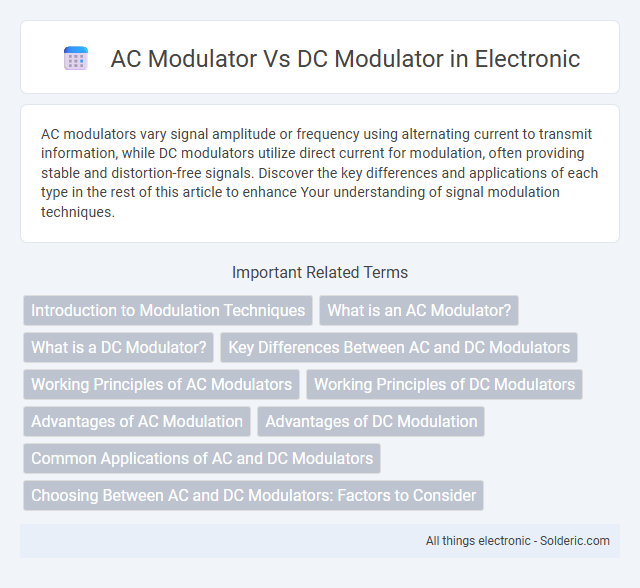AC modulators vary signal amplitude or frequency using alternating current to transmit information, while DC modulators utilize direct current for modulation, often providing stable and distortion-free signals. Discover the key differences and applications of each type in the rest of this article to enhance Your understanding of signal modulation techniques.
Comparison Table
| Feature | AC Modulator | DC Modulator |
|---|---|---|
| Signal Type | Alternating Current (AC) | Direct Current (DC) |
| Frequency Range | Wide frequency range, typically high-frequency applications | Low-frequency or constant signal applications |
| Modulation Method | Amplitude, frequency, or phase modulation of AC signals | Amplitude modulation via varying DC voltage levels |
| Use Cases | Radio broadcasting, TV transmission, RF communication | Power supply control, signal conditioning, biasing |
| Complexity | More complex circuitry due to varying signal polarity | Simpler design, stable signal polarity |
| Efficiency | High efficiency in signal transmission over distance | Efficient for steady-state control and low-frequency signals |
| Typical Components | Transformers, capacitors, oscillators | Resistors, transistors, voltage regulators |
Introduction to Modulation Techniques
Modulation techniques are essential for encoding information onto carrier signals, with AC modulators using alternating current to vary amplitude, frequency, or phase, while DC modulators manipulate direct current levels for signal control. AC modulation is predominant in radio frequency transmission due to its efficiency in long-distance communication and noise resistance. Your choice between AC and DC modulators depends on the application requirements, such as signal range, power consumption, and environmental stability.
What is an AC Modulator?
An AC modulator is a device that varies an alternating current (AC) signal's amplitude, frequency, or phase to encode information for transmission. It operates by imposing a message signal onto a high-frequency AC carrier wave, enabling efficient signal broadcasting over long distances. AC modulators are fundamental in radio frequency communication systems, including AM and FM transmitters.
What is a DC Modulator?
A DC modulator is an electronic device that modifies a direct current (DC) signal to encode information by varying its amplitude, frequency, or phase. Unlike AC modulators that work with alternating current signals, DC modulators maintain a constant polarity while allowing adjustments in signal parameters for applications such as communication systems, signal processing, and control circuits. This type of modulation is essential for systems requiring stable and noise-resistant signal transmission over long distances.
Key Differences Between AC and DC Modulators
AC modulators use alternating current to vary signal amplitude or frequency, enabling efficient transmission of audio/video signals over cable systems, while DC modulators rely on direct current for simpler, low-frequency applications. AC modulators provide better signal stability and reduced interference due to their ability to handle varying signal phases, unlike DC modulators which may suffer from baseline drift and noise issues. Understanding these key differences helps you choose the appropriate modulator for your specific communication or broadcasting needs.
Working Principles of AC Modulators
AC modulators operate by varying the amplitude, frequency, or phase of an alternating current (AC) carrier signal in accordance with the input message signal. This modulation process involves superimposing the information onto the AC waveform, enabling efficient transmission over communication channels. The working principle of AC modulators relies on the continuous oscillation of the carrier frequency, which allows for stable signal modulation and demodulation.
Working Principles of DC Modulators
DC modulators operate by varying the amplitude, frequency, or phase of a direct current (DC) carrier signal to encode information, typically using techniques like pulse-width modulation (PWM) or pulse-density modulation (PDM). Unlike AC modulators that modulate alternating current signals, DC modulators maintain a constant polarity and rely on precise timing control to achieve signal modulation. This approach enables efficient power conversion and accurate control in applications such as motor drives and power supplies.
Advantages of AC Modulation
AC modulation offers enhanced noise immunity and reduced signal degradation over long distances, making it ideal for reliable communication systems. It enables more efficient power transmission with lower losses compared to DC modulation, improving overall system performance. Furthermore, AC modulation facilitates simpler and cost-effective transformer-based voltage level adjustments, enhancing flexibility in various applications.
Advantages of DC Modulation
DC modulation offers superior linearity and lower power consumption compared to AC modulation, making it ideal for low-noise applications and efficient signal transmission. It provides better signal stability and reduced electromagnetic interference, enhancing overall system performance. The ability to precisely control signal amplitude in DC modulation contributes to improved accuracy in communication and measurement systems.
Common Applications of AC and DC Modulators
AC modulators are commonly used in radio frequency transmission and communication systems to vary the amplitude or frequency of AC carrier waves, enabling efficient signal modulation for broadcasting and wireless communication. DC modulators find applications in analog circuit control, such as voltage regulation, signal conditioning, and servo motor speed control, where precise and stable modulation of DC voltage levels is crucial. Understanding the specific requirements of your application helps determine whether an AC or DC modulator provides optimal performance in signal modulation and control.
Choosing Between AC and DC Modulators: Factors to Consider
Choosing between AC and DC modulators depends on factors such as signal type, noise tolerance, and power requirements. AC modulators excel in reducing noise and interference in communication systems, while DC modulators offer precise control and stability for low-frequency applications. Understanding your system's signal characteristics and operational environment helps determine the optimal modulation method for performance and efficiency.
AC modulator vs DC modulator Infographic

 solderic.com
solderic.com